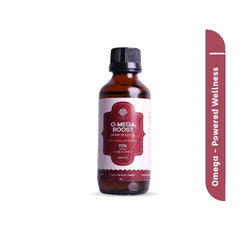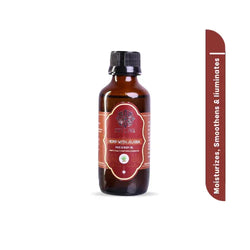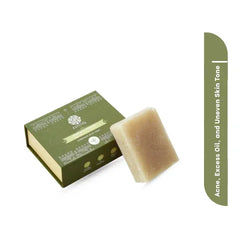Pesky dandruff is a trending topic, especially in the cold season. Scratchy heads and wash-proof, white flakes haunt a wide population. It is a debatable topic that is surrounded by numerous myths. While some say, it is caused due to dry skin, others blame oily skin for it. Some hold weather as the culprit, while others think improper cleansing of scalp and stress are factors triggering it. However, most scientists say dandruff is actually a fungal infection.
A common discussion around dandruff is if it can be treated or only controlled. So, let’s try to separate truth from myth in this post and understand its causes and find the right solution.
What Is Dandruff?
Dandruff is characterized by small white flakes emerging from the scalp. While every head has some amount of flaking, as dead skin cells scale out of your scalp, many people experience an unusually large amount of flaking. This shows up as tiny white snowflakes all over the hair and even the shoulders. Technically, dandruff is a condition of the scalp, caused by a fungus, Malassezia, which feeds on sebum. Sebum is the oily matter secreted by the sebaceous glands and the dead skin cells.
Who Gets Affected?
Malassezia microbe is a normal part of everyone’s scalp, but for a few, who have a sensitive scalp, the fungus feeds on sebum, breaking it down into fatty acids that causes irritation. This causes dryness and itchiness of the scalp and leads to the dead skin cells accumulating into visible flakes. People develop mild or acute dandruff based on the level of sensitivity to these fatty acids.
Can Dandruff Cause Hair Fall?
Dandruff is not directly related to the loss of hair. It is the shedding of dead skin cells, causing itching and flaking of the scalp. If it is not treated, the itchy scalp causes inflammation and result in temporary hair loss. But if you treat the problem, the hair can grow again.
Is Dandruff seasonal?
Malassezia grows more in moist environments like excessive humidity and sweating, therefore evolve in summers and monsoons. Having said that, in winters, chilling cold wind takes away the scalp moisture causing dryness, resulting in itching and flaking. Dandruff is on top of the head all year round. And sadly, there is no way to completely get rid of it, but with a few home remedies or natural products, it is possible to keep it under check.
Natural Remedies To Treat Dandruff
If you would like to get rid of that pesky dandruff, try these effective remedies. These treatments are natural, free from harsh chemicals, and definitely will not harm your hair in any way.
1. Neem leaves
Neem leaves help relieve itching and inhibit the growth of dandruff-causing fungus. Neem leaves should be immersed in hot water for overnight. The strain can be used to rinse your hair or a paste can be prepared and applied on the scalp. Keep it for one hour and wash it off with water.
2. Aspirin
Aspirin contains salicylates that exfoliate the scalp and controls dandruff. Take 2 aspirin tablets, crush it and mix it with your regular shampoo while applying. Let it stay on your hair for two minutes and then rinse.
3. Apple Cider Vinegar
It is an excellent way of attacking the fungus that causes dandruff, as it gives instant relief from itchiness and dandruff with just a few applications. You need to dilute the vinegar with water in equal quantities. Use this solution as shampoo.
4. Lemon Juice
Freshly squeezed lemon juice contains acids that break down the fungus layer. You can apply 2 tablespoons of lemon juice directly on your scalp or dilute it with water and rinse your hair. Don’t keep it for a longer duration before wash, but apply it more frequently.
5. Yoghurt
Sour curd or yogurt is acidic, it conditions the hair, and helps combat dandruff. Whisk the curd and apply it to your scalp for one hour like a mask. Wash thoroughly with a mild shampoo.
6. Orange peels
Orange peels are acidic helps reduce excess oil and condition the scalp. Mix 3-4 dry orange peels with 5-6 tablespoons of lemon juice to form a paste. Keep it on for 30 minutes and then rinse off with shampoo.
7. Baking Soda
Baking soda fights well with dandruff-causing overactive fungi. It acts as an exfoliator to remove the dead skin and absorb excess oil. Rub a tablespoon of baking soda on your wet hair and scalp, leave for a minute, and wash it off. There are a few more to count, but even after using them all, you still need some hair creams and shampoo to clean the hair and scalp.
8. Right Hair Products
Some 100% organic hair creams and shampoos by Satliva are highly endorsed.
Satliva Cannmelon Hair Cream
It contains watermelon seed oil that has oleic acid, stearic acid, Vitamin B, copper, manganese, magnesium, and zinc. When applied on the scalp, the watermelon seed oil controls the excessive oiliness on the scalp and avoids the glossy look on the hair. Watermelon seed oil, when combined with the amazing hemp seed oil, deeply nourishes the scalp and hair. This ultra-light cream does not clog pores, so no dirt can accumulate on the scalp.
Hemp with Argan and Activated Charcoal Shampoo Bar
It cleans and removes impurities while absorbing excess oils without stripping the hair of natural oils. This is a shampoo and conditioner in a bar made with Hempseed Oil, Castor Oil, Coconut Oil, Palm Oil, Argan Oil, Activated Charcoal, Peppermint Essential Oil and Lemon Grass Oil.
Try and let us know, which one worked for you?




